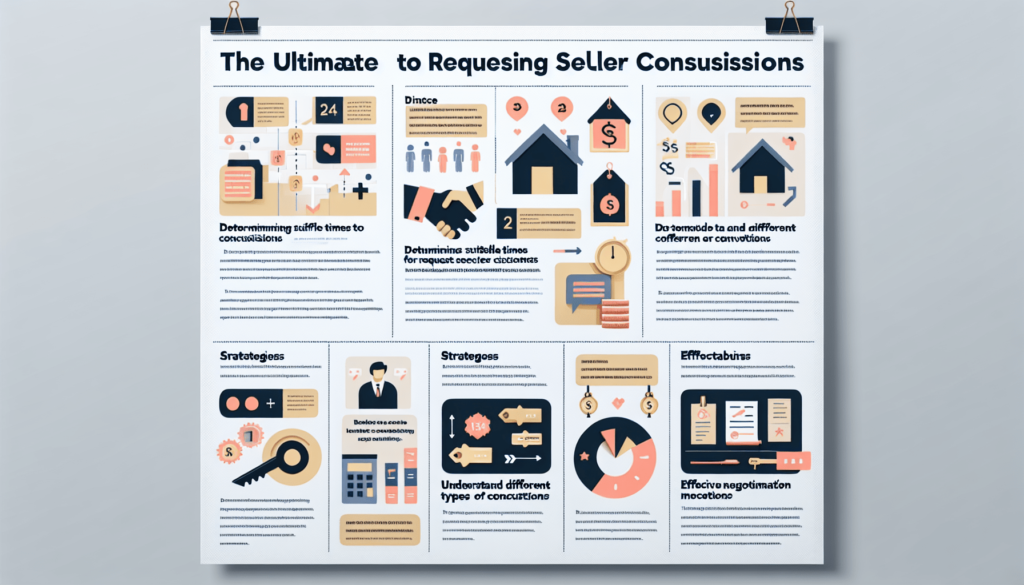
Are you in the process of buying a new home? If so, you may have heard about the possibility of requesting seller concessions. In this comprehensive guide, we will walk you through the dos and don’ts of requesting seller concessions, ensuring that you have all the information you need to navigate this negotiation process successfully. Whether you are a first-time home buyer or an experienced investor, this guide will provide you with valuable insights and strategies to secure the best possible deal. So, let’s dive in!

Understanding Seller Concessions
What are seller concessions?
Seller concessions refer to the financial incentives that sellers offer to buyers during the real estate transaction process. These concessions can help buyers by reducing their upfront costs and making the purchase more affordable. Seller concessions can include covering closing costs, offering repair credits, or even reducing the sale price of the property.
Why do buyers request seller concessions?
Buyers often request seller concessions to alleviate the financial burden associated with purchasing a home. By asking for concessions, buyers can save money on closing costs, repairs, or other expenses involved in the transaction. It can also help buyers who may not have sufficient funds for a down payment or who want to keep their cash reserves intact for future needs.
Types of seller concessions
There are several types of seller concessions that buyers may request. The most common include covering closing costs, providing repair credits, including furniture or appliances in the sale, or reducing the sale price of the property. Each type of concession has its own benefits and considerations, and it’s important for buyers to understand which concessions would be most beneficial for their specific needs and financial situation.
Preparing to Request Seller Concessions
Assessing your financial situation
Before requesting seller concessions, it’s important to assess your financial situation and determine how much you can afford to spend on purchasing a property. This includes considering your current income, expenses, savings, and any existing debts or financial obligations. By understanding your financial capabilities, you’ll have a better idea of what concessions you may need to request to make the purchase feasible.
Determining the amount of concessions needed
Once you have a clear understanding of your financial situation, you can determine the amount of concessions you’ll need from the seller. Consider factors such as closing costs, repairs or renovations needed, and any other expenses associated with the purchase. It’s essential to be realistic and determine the appropriate amount of concessions that would make the transaction viable for you.
Researching applicable laws and regulations
Before entering into negotiations for seller concessions, it’s crucial to research and understand the laws and regulations that govern these transactions in your area. Each jurisdiction may have specific rules regarding seller concessions, and it’s important to ensure that your requests comply with these regulations. Consulting with a real estate attorney or agent can help you navigate through any legal complexities.

Building a Strong Negotiation Strategy
Knowing your leverage as a buyer
To build a strong negotiation strategy, it’s essential to understand your leverage as a buyer. Factors that can influence your bargaining power include the current real estate market conditions, the seller’s motivation to sell, and the competition for the property. By having a clear understanding of your leverage, you can approach the negotiation process with confidence and increase your chances of success.
Identifying the seller’s motivation
Understanding the seller’s motivation is a crucial aspect of negotiating for seller concessions. If the seller is in a hurry to sell the property or is facing financial difficulties, they may be more inclined to agree to concessions. On the other hand, if the seller is in a strong position and has multiple offers, they may be less willing to provide concessions. Researching the seller’s situation can give you insights into their motivations, helping you craft a persuasive negotiation strategy.
Consulting with your real estate agent
Engaging the services of a reliable and experienced real estate agent can greatly assist in building a strong negotiation strategy. Your agent can provide valuable insights into the local real estate market, advise you on appropriate concession requests, and assist you in developing a persuasive argument to present to the seller. Their expertise can be instrumental in ensuring that your negotiation strategy is effective and gets you the best possible outcome.
Crafting the Request for Seller Concessions
Being specific and realistic
When crafting your request for seller concessions, it’s crucial to be specific and realistic. Clearly outline the concessions you are seeking and provide detailed explanations for each request. It’s important to ensure that your requests are reasonable in light of the property’s condition, market value, and the seller’s motivation. Being specific and realistic demonstrates your thoroughness and increases the chances of the seller considering your requests seriously.
Listing the desired concessions
In your request, provide a comprehensive list of the concessions you are seeking from the seller. This can include specific dollar amounts or percentages for closing costs, repair credits, or any other expenses. By clearly listing the desired concessions, you provide the seller with a clear understanding of what you are asking for and make it easier for them to consider your requests.
Explaining your reasons for requesting concessions
It’s crucial to explain the reasons behind your request for seller concessions. Whether it’s to cover necessary repairs or to assist with your financial situation, providing a clear and honest explanation can help the seller empathize with your situation. By demonstrating your genuine need for concessions and being transparent about your circumstances, you create a stronger case for the seller to consider your requests.

Presenting the Request to the Seller
Choosing the right communication method
When presenting your request for seller concessions, it’s important to choose the right communication method. This can include a formal written offer, a face-to-face meeting, or even a phone call. Consider the seller’s preferred mode of communication and choose a method that allows for a clear and comprehensive presentation of your request. A formal written offer can be a good option as it provides a documented record of your request.
Timing the request appropriately
Timing is key when presenting your request to the seller. It’s essential to choose an appropriate time in the negotiation process to make your request for concessions. Presenting the request too early may appear premature, while presenting it too late may limit the seller’s ability to consider your requests. Working closely with your real estate agent can help you determine the optimal timing to present your request for seller concessions.
Being professional and respectful
When presenting your request for seller concessions, it’s important to maintain a professional and respectful demeanor. Approach the seller with a friendly and positive attitude, emphasizing your appreciation for the property and the opportunity to negotiate. This respectful approach creates a more favorable environment for productive negotiations and increases the likelihood of the seller considering your requests.
Handling Seller Responses
Analyzing counteroffers
Once you’ve presented your request for seller concessions, it’s essential to carefully analyze any counteroffers from the seller. Consider the concessions they are willing to provide and evaluate their overall impact on your financial situation. It’s important to assess whether the counteroffers align with your initial objectives and whether they adequately address your needs. Analyzing counteroffers allows you to make informed decisions and negotiate further if necessary.
Negotiating further if needed
If the seller’s initial concessions do not fully meet your needs, further negotiation may be necessary. Engage in open and respectful discussions with the seller to find common ground and explore potential solutions. Identify areas where you can compromise without jeopardizing your financial capabilities. Skilled negotiation can help you achieve a mutually beneficial agreement that aligns with your requirements.
Considering alternatives if concessions are denied
In some cases, the seller may deny your request for concessions. If this happens, it’s important to consider alternative solutions. This can involve reevaluating your budget and exploring other financing options, seeking out additional financial assistance, or reviewing other properties that may better suit your needs and financial capabilities. By remaining flexible and open to alternatives, you can still achieve a successful purchase even if concessions are not granted.

Navigating the Closing Process with Concessions
Including concessions in the purchase agreement
If the seller agrees to provide concessions, it’s important to include them in the purchase agreement. This ensures that the agreed-upon concessions are legally binding and protects both parties’ interests. Work closely with your real estate agent and attorney to accurately document the concessions and incorporate them into the agreement. Including concessions in the purchase agreement adds clarity and avoids any potential misunderstandings.
Coordinating with lenders and agents
During the closing process, it’s crucial to coordinate with your lenders and real estate agents to ensure a smooth transaction. Communicate any agreed-upon concessions to all relevant parties to ensure proper documentation and compliance with lending and legal requirements. Effective coordination helps streamline the closing process and minimizes any potential delays or complications.
Ensuring compliance with legal requirements
When navigating the closing process with concessions, it’s essential to ensure compliance with all legal requirements. This includes adhering to any local regulations regarding seller concessions, completing the necessary paperwork accurately, and following any additional steps mandated by the jurisdiction. Working closely with legal and real estate professionals will help you navigate these requirements and avoid any legal pitfalls.
Common Mistakes to Avoid
Requesting excessive concessions
One common mistake to avoid when requesting seller concessions is requesting excessive concessions. Asking for concessions beyond what is reasonable may be perceived as unreasonable or pushy, potentially damaging the negotiation process. It’s important to carefully assess your needs and make requests that align with the property’s condition and market value.
Failing to research applicable laws
Another mistake to avoid is failing to research the applicable laws and regulations regarding seller concessions. Each jurisdiction may have specific rules and limitations regarding the concessions that can be offered or accepted. Failing to comply with these regulations can lead to legal issues or even the nullification of the transaction. Thoroughly researching and understanding the laws ensures a smooth and legally compliant process.
Being inflexible during negotiations
Flexibility is key during negotiations for seller concessions. Being too rigid or inflexible can hinder the negotiation process and prevent finding mutually beneficial solutions. It’s important to enter negotiations with an open mind, willing to compromise on certain aspects while still ensuring your needs are met. Maintaining flexibility increases the chances of reaching a successful agreement.
Understanding the Risks and Benefits
Advantages of requesting seller concessions
Requesting seller concessions can provide several advantages for buyers. By reducing upfront costs, concessions can make the purchase more affordable and accessible. Buyers can save money on closing costs or repairs, allowing for a smoother financial transition into homeownership. Seller concessions can also help buyers who may not have sufficient funds for a down payment, improving their ability to secure a mortgage and purchase their desired property.
Potential drawbacks and risks
While there are advantages to requesting seller concessions, there are also potential drawbacks and risks to consider. Sellers may be less willing to negotiate on other terms or may choose to accept a competing offer if they perceive the concessions to be excessive. Additionally, depending on the local market conditions, requesting concessions could negatively impact the seller’s perception of your offer. It’s important to carefully weigh the potential risks when requesting concessions.
Weighing the pros and cons for your specific situation
When considering whether to request seller concessions, it’s crucial to weigh the pros and cons based on your specific situation. Evaluate your financial capabilities, the property’s condition, and the local market conditions to determine whether concessions would be advantageous or if alternative solutions may be more suitable. By carefully considering your circumstances, you can make an informed decision that maximizes the benefits and minimizes the risks of requesting concessions.
Maximizing the Value of Concessions
Using concessions strategically
To maximize the value of concessions, it’s important to use them strategically. Identify the areas where you would benefit most from concessions and focus on those aspects during negotiations. For example, if closing costs are your main concern, emphasize this when presenting your request. By strategically utilizing concessions, you can optimize their value and improve the overall outcome of the transaction.
Leveraging concessions for desired outcomes
Concessions can be leveraged to achieve desired outcomes during the negotiation process. For example, if the seller is hesitant to provide financial concessions, you can negotiate for other benefits such as including furniture or appliances in the sale. By understanding the seller’s motivations and needs, you can identify alternative concessions that may still align with your objectives.
Managing expectations
It’s important to manage your expectations when requesting concessions. Sellers may not agree to all of your requests, and compromises may need to be made. By setting realistic expectations and understanding that concessions are not guaranteed, you can navigate the negotiation process with more agility and maintain a positive perspective. Being open to alternatives and remaining flexible can help you achieve a successful outcome, even if concessions are not granted in their entirety.
In conclusion, understanding and requesting seller concessions is an important aspect of the home buying process. By preparing effectively, building a strong negotiation strategy, and crafting a compelling request, buyers can increase their chances of obtaining concessions that meet their needs. Navigating the closing process and managing expectations ensures a smooth transaction. By understanding the risks and benefits and maximizing the value of concessions, buyers can make the most of this opportunity. Remember to approach the process with professionalism and respect to foster positive negotiations and achieve a successful outcome.